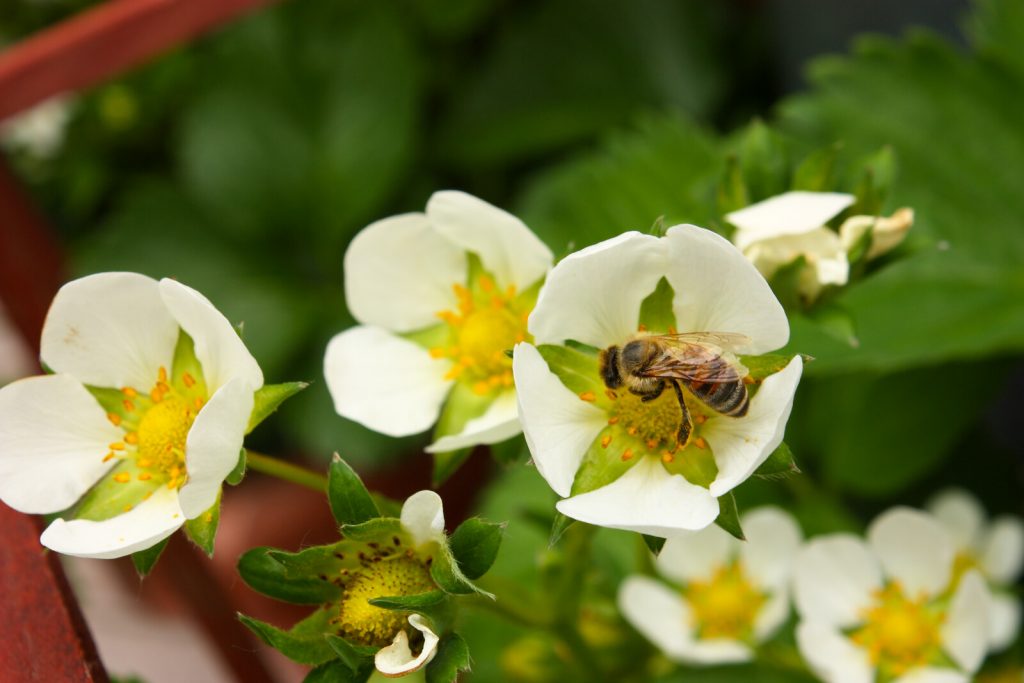Consumers Want Pro-Pollinator Action From More Companies
Integrated pest management (IPM), a decades-old, environmentally sensitive technique, is the basis for all pest management decisions on farms with EFI certification.
EFI’s pest management standards support:
- Developing and maintaining an IPM Plan, which uses a combination of biological, cultural and physical controls before turning to chemical controls.
- Considerations for maintaining healthy soil and clean water.
- Safe use and storage of pesticides.
- Farmworkers trained in pesticide safety and basic IPM concepts and an EFI Leadership Team briefed on farm IPM measures and goals.
Why IPM Is the Base of EFI’s Pest Management Standards
Improving conditions for farmworkers in the food supply chain is a main focus of the EFI Program. IPM is one way to achieve this goal, as it reduces risks to people and the land by employing practices that minimize the use of chemicals and centering around natural and low-toxicity methods for addressing pest issues.
Continual monitoring and working toward long-term prevention of disease and pest imbalance through ecosystem management enables growers to make decisions to avoid pest and disease problems before they happen, thereby reducing the need for harsh chemicals.
Through the training received as a part of compliance with EFI’s pest management standards, farmworkers become knowledgeable and empowered to ensure compliance with environmental stewardship standards.
“Before EFI, six years ago, the ‘spider’ [pesticide application equipment] passed and one crouched [in the fields]. We did not have knowledge about the applications or when they would be applied.”
– Female Farmworker
“We started using more biological products and traps. The use of red label products* decreased this season. We use bees for pollination. The tomato is organic.”
– Manager
*Term used for pesticides of high-toxicity
Walmart’s Pollinator Health Commitments and EFI
This past year, 10 retailers improved their scores on the Bee-Friendly Retailer Scorecard by Friends of the Earth, which ranks 25 of the largest U.S. grocery retailers on pesticides and pollinator protection in their food and beverage supply chains. Four retailers implemented new pollinator health policies, with Walmart U.S.’s 2021 pollinator health commitments the most far-reaching to date of any U.S. food retailer, centering around adopting a third-party verified IPM system by 2025.
By 2025, 100% of Walmart U.S.’s fresh produce and floral suppliers will be required to show third-party verification for their IPM system and are encouraged to establish pollinator habitats on at least 3% of the land they use, as well as phase out the use of certain chemicals.
EFI has been named a qualified third-party certifying organization that meets Walmart U.S. pollinator health commitments and can also verify compliance with the Ethical Charter on Responsible Labor Practices for Walmart.
Margaret Stuart, senior compliance manager for EFI-certified sweet corn grower and packer Rouge River Farms says, “EFI is a combination of putting all the rules into one package. You could have three different audits or you could have one. EFI is not just another audit or a label to put on your product, it’s holistic and it can make your company better.”
Consumer Demand Continues to Trend Toward Pro-Pollinator Action

A recent article from Food Tank asserts that American consumers think grocery stores have a role to play in reducing pesticide use and protecting pollinators.
Consider these statistics from a poll by Friends of the Earth of nearly 1,500 shoppers:
- 83% said it is important to eliminate agricultural pesticides that are harmful to pollinators like bees and butterflies
- 74% believe grocery stores should support efforts to protect pollinators such as bees and butterflies
- 65% said that a grocery store’s formal commitment to eliminate harmful pesticides from its food supply could sway them to shop there
- 63% said that a grocery store’s formal commitment to protect pollinators like bees and butterflies in its food supply could sway them to shop there
EFI can help growers navigate the evolving landscape of increasing demand from consumers and retail buyers for social and environmental sustainability by providing customized workforce development training and one-stop-shop certification covering labor practices, food safety and pest management.
Take our grower interest quiz to see how EFI can help your organization keep up with future IPM and social responsibility demands.

